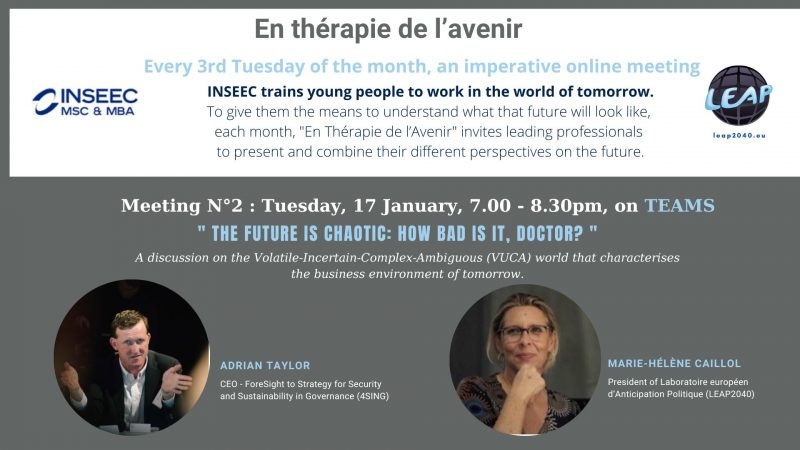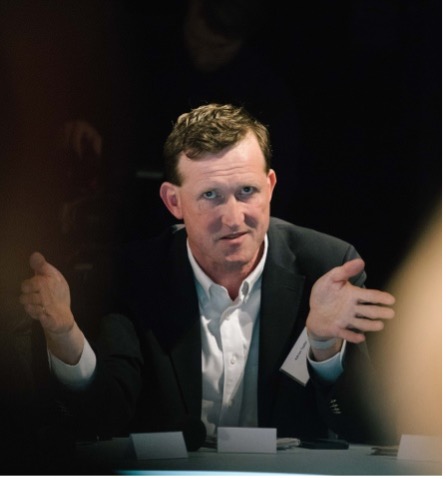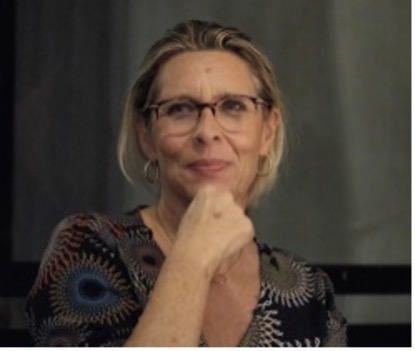Conference INSEEC & LEAP – The future is chaotic: how bad is it, doctor? (17 Jan)

Seance N°2 : Tuesday 17 January, 7.00-8.30pm on TEAMS
« The future is chaotic: how bad is it, doctor? »
around the foresight to strategy expert, Adrian Taylor (speech in English)
A discussion on the Volatile-Incertain-Complex-Ambiguous (VUCA) world that characterises the business environment of tomorrow.
Why is it such a mess? Is it just the climate, the new technologies, the US-China rivalry? Or is it bigger than that ? According to what logic is the world being transformed? What are the main drivers behind it? How does this transformation impact all sectors of activity and all disciplines? Why does understanding the ongoing transformation process help us to regain control of the future? What shocks still await us on the road to the great transition?
Programme of the conference
19h00 : Welcome and moderation, by Marie-Isabelle Deplanche, master student at l’INSEEC and management attaché in retirement home
19h05 : Is the VUCA world a given for a young person today? By Mathilde Colin, McS2
19h10 : Presentation of the results of the quiz « Are you VUCA-friendly ? », by Robin Maupu, student
19h15 : Intervention keynote : ” Chaotic world: understanding, anticipating, regaining control “, by Adrian Taylor, foresight to strategy expert :
Our modern society, with its multiplicity of global and local interactions is particularly complex. When complex systems transition from an equilibrium, they naturally generate volatility. This not about to change tomorrow. The key is not to focus on what the source of the surprises of tomorrow will be, but rather to anticipate the consequences. And these are usually visible around us: the world of tomorrow is already here today (fractal), and it is unevenly spread. By anticipating the plausible worlds we may have to live in, we can take back control of what to do, rather than being frozen in analysis paralysis. We can identify the “no regrets” decisions that are good in all cases, as well as leave the door open to options that allow us to change course if certain surprises do occur.
19h35 : 1st round of Q&A
19h50 : Co-speech : « Global systemic crisis: a dominant view of the state of the world», by Marie-Hélène Caillol, teacher at INSEEC and president of LEAP2040
In order to regain control of the future, we must first understand the drivers at work. The notion of “crisis” or “transition” of the global system, by proposing the widest possible angle of view, sets out rails for interpretation of the evolution of the world that make it possible to significantly reduce the destabilising effects of surprises, that the news have been so generous of in the last two decades. The aim here is not to prevent them but to reduce the power of the shocks. In 10 minutes, Marie-Hélène will present the main principles of this “crisis”.
20h00: 2nd Q&A round
20h30 : End of the conference
THE SPEAKERS
A few words on Adrian (keynote) :

Adrian Taylor runs ForeSight to Strategy for Security and Sustainability IN Governance (4SING) GmbH, a boutique consultancy firm based in Hamburg that helps both public and private sector clients to use participative foresight methods to formulate robust strategy options.
Adrian has over three decades of working experience, notably focused on foresight to strategy. He has worked on dozens of projects in the chemicals industry, energy, and more recently the green economy, with clients having included AkzoNobel, BASF, Bayer, EBRD, Generali, the IKEA Foundation, Service Industriel de Genève, Total Petrochemicals, Westlake and the World Economic Forum. Adrian has a 1st Class Honours Degree in Philosophy, Politics and Economics Trinity College Oxford, and a Licence Spéciale (Masters) in European Studies with “Grande Distinction” from the Université Libre de Bruxelles.
A few words on Marie-Hélène (co-speaker) :

Marie-Hélène teaches geopolitics and anticipation at INSEEC, and coordinates the conferences “En Thérapie de l’Avenir”. She is also president of the European Laboratory of Political Anticipation (LEAP2040). A sociologist by training, she defines herself today as a political and anticipation scientist, a rational and intuitive method for exploring the future.
Since 2006, in the framework of the monthly publication GlobalEurope Anticipation Bulletin, she has been closely studying the “global systemic crisis”, which provides a particularly effective explanatory framework for the VUCA state of the world, using the tools of anticipation.
Access link here: TEAMS